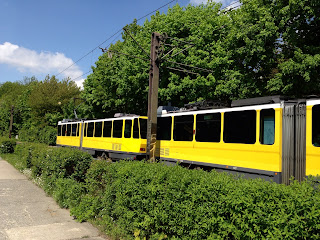Guest blogger Dave writes:
Urban agriculture is a concept which apparently originated in New York, and has since been enthusiastically taken up by metropolitan centres around the world, as here in the German capital Berlin.
Urban agriculture is a concept which apparently originated in New York, and has since been enthusiastically taken up by metropolitan centres around the world, as here in the German capital Berlin.
Strange to think these sheep are grazing just a couple of kilometres from the grim concrete fortress which was home to the former East Germany's secret police, the Staasi - hated and feared in equal measure by the GDR's beleaguered citizens.
As
well as the flock, bees are thriving and producing honey amid the communist-era
tower blocks.
This being Berlin, the local graffiti artists have also been hard
at work making their own colourful mark on the landscape.
Most
Berliners live in flats, so access to private outdoor space is at a premium.
Allotments are especially highly prized and hardly ever come onto the
open market. Known as "garden colonies", allotments also act as
flourishing social centres. Most of the colonies boast a beer garden, and
gardeners are keen on swapping their fruit and veg among themselves. The rules
governing the colonies are dauntingly complicated, and as with British beach
huts, you're not supposed to live on site. Still, for most colonists their
allotment is a lifelong commitment.
Despite
being roughly the same size geographically as London, Berlin's population is
only about a third as big, and that lower density means there's plenty of
greenery. And thanks to the super efficient German public transport system, no
matter how far you venture out into the woods, there's always a tram, train or
bus to get you home.


















































